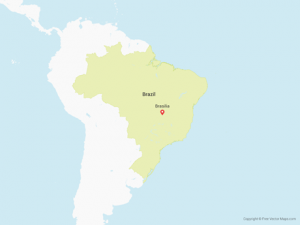 As we explore the state of behavior analytic services for individuals with autism , I invited several colleagues from around the world to serve as guest bloggers.
As we explore the state of behavior analytic services for individuals with autism , I invited several colleagues from around the world to serve as guest bloggers.
Our guest blogger this month is Amanda Bueno, M.A., BCaBA, Director of CEDIN in Paraná, Brazil. [Edited by Corina Jimenez-Gomez. The content of this entry reflects the opinion of the original author]

When you live in a country where the intervention of developmental disabilities is not both culturally and historically acknowledged by sciences, it is very challenging to disseminate evidence-based practices and autism awareness. Especially when pseudoscience is the common rule. Unfortunately, Brazil is a place where we have this panorama.
 The Federative Republic of Brazil is a vast South American country. At 8.5 million square kilometers (3.2 million square miles) and with over 210 million people, Brazil is the world’s fifth-largest country by area and has almost 3% of the world’s population. Portuguese is the official language of Brazil. The country is one of the most multicultural and ethnically diverse nations, due to mass immigration from around the world. Brazil is currently considered an advanced emerging economy. In the areas of science, technology, and education we are, unfortunately, experiencing the opposite. Funding for research in areas from bacteria resistance to Zika virus were largely cut. Research in Brazil is largely carried out in public universities and research institutes, with the majority of funding for basic research coming from various government agencies. For the previous 20 years, funds for science and education have been practically frozen. Thus, leaving advances in science and technology, as well as education, lagging behind.
The Federative Republic of Brazil is a vast South American country. At 8.5 million square kilometers (3.2 million square miles) and with over 210 million people, Brazil is the world’s fifth-largest country by area and has almost 3% of the world’s population. Portuguese is the official language of Brazil. The country is one of the most multicultural and ethnically diverse nations, due to mass immigration from around the world. Brazil is currently considered an advanced emerging economy. In the areas of science, technology, and education we are, unfortunately, experiencing the opposite. Funding for research in areas from bacteria resistance to Zika virus were largely cut. Research in Brazil is largely carried out in public universities and research institutes, with the majority of funding for basic research coming from various government agencies. For the previous 20 years, funds for science and education have been practically frozen. Thus, leaving advances in science and technology, as well as education, lagging behind.

Behavioral Science in Brazil
Behavior Analysis was introduced in Brazil by Fred Keller in the 1960s. He traveled to Brazil as a Fulbright Scholar during sabbatical from University of Columbia, invited to the Universidade de São Paulo (USP) by the Director of the College of Philosophy, Sciences, and Letters. Dr. Keller helped to establish Experimental Psychology in Brazil. Despite the existence of recognized Masters and PhD programs in Experimental Analysis of Behavior in the country since then, the applied field lags behind and remains an area in need of development.
In Brazil, there are currently 14 Board Certified Behavior Analysts, and 4 Registered Behavior Technicians (RBT). Their backgrounds are mostly EAB and Psychology. I am currently the only Board Certified Assistant Behavior Analyst (BCaBA), and my center , CEDIN, has on the team 3 of the 4 RBTs in the country.
In Brazil, we lack opportunities for applied training at the masters and PhD level, as well as opportunities for continuing education and verified course sequences. It is important to emphasize that the continuous efforts to offer Verified Course Sequences is impacted by the lack of Board Certified professionals currently serving as professors in existing graduate programs. As a result, there are few behavior analytic service providers, following the BACB standards, in the country able to serve individuals with autism or other developmental disabilities. As a result, however, there has been a surge of providers offering alternative treatments.
Additional barriers for the practice of applied behavior analysis are posed by the misconception regarding autism, such as attributing the probable cause of autism to poor maternal relationship or vaccines, beliefs that it is contagious, the extensive offering of miracle cures, and the dissemination of non-evidence-based interventions (e.g., bleach therapy, ozone therapy, quantum healing). The most common treatments for individuals with autism are psychoanalysis, family constellation, access bars, diets, vitamins, sensory integration, and animal therapy.. Although Applied Behavior Analysis (ABA) has been empirically shown to be effective in a wide variety of areas, there is also a misconception about how ABA works. Very often, people raise question about ABA being “dog training”, that reinforcement is bribery, that the intervention turns clients into robots. Further, BACB credentials are not widely recognized in the country, and there is no formal regulation for professionals on the applied filed. In an attempt to change this panorama, the ABPMC, Brazilian Association of Medicine and Behavioral Psychology, recently announced a proposal of registration and guidelines for Behavior Analysts on different levels: technician, assistant, and supervisor.
As a result of the lack of behavioral service providers and misconceptions regarding autism the field of behavior analysis, pseudoscience continues to grow and the reputation of our field is hindered. For a parent it is difficult to distinguish well-trained professionals offering evidence-based services from those offering services with unsubstantiated claims. This is especially true when credentials for service providers are not regulated and very often parents base their decisions only on the pitfalls of testimonials. Even when parents identify what is the effective intervention, there are not enough providers for the demand. Additionally, even if a family can find a provider, only wealthy families can afford the services, given health insurance companies in Brazil do not cover ABA services.
Dissemination of our science and evidence-based practices for autism treatment must be a continuous work conducted by all behavior analysts in every corner of the world. The need for qualified course sequences, supervision, and providers is high. Thus, turning dissemination into action is imperative. This has become part of my mission.
Paraná as a model for change
Currently, the state of Paraná, in the deep south of Brazil, is the only state in Latin America with an autism spectrum disorder (ASD) law that protects this vulnerable population from harm. The text of the law says that: “People with ASD will not be subjected to inhuman or degrading treatment, or without scientific evidence.” Last year, I had the amazing opportunity to co-author the text of this law. As a result of the approval of this law and my relationship to the Florida Institute of Technology as a student, I had the opportunity to propose a partnership between The Health Department of Paraná, with Florida Tech. The partnership was approved in 2018. After much work and coordinating between the Paraná government and behavior analysts at Florida Tech, this year a transfer of technology to Paraná will become reality. The expected outcome will be potentially up 3,000 practitioners from the public health system trained in basic behavior analytic interventions and caregiver training will be provided to 399 municipalities. The ultimate goal is for ABA services to be available for all by eliminating barriers to service. Through training, we are able to eliminate the barrier of accessibility to adequately trained service providers. The barrier of the cost of service can be address by working with government agencies. The public health system is Brazil is called Sistema Único de Saúde (SUS), and provides services for free, without health insurance.
This work in my state of Paraná is only the first step to empower families and professionals, a foundation for building savvy consumers and providers. More can be done if more people support initiatives in Brazil. I not only have hope that together we change this barriers to opportunities, but I am certain that the change has already begun.
References:
Legislative Assembly of Parana. (2018) https://www.legislacao.pr.gov.br/legislacao/pesquisarAto.do?action=exibir&codAto=93348&codTipoAto=&tipoVisualizacao=compilado
Bueno, A., & Celiberti, D. (2018). Treatment Summary, Bleach Therapy. Science in Autism Treatment, 15 (3), 18.
Mruzek, D. W. (2012). The pitfalls of testimonials. Science in Autism Treatment, 9(2), 12.
https://brasil.elpais.com/brasil/2019/09/03/politica/1567542296_718545.html
http://abpmc.org.br/arquivos/publicacoes/1556901447d2fb7c4f8e55.pdf

Would you like to hear about behavior analytic services in a particular part of the world? Let me know!
Would you like to share your experiences from your corner of the world? Contact me!


 Follow the
Follow the